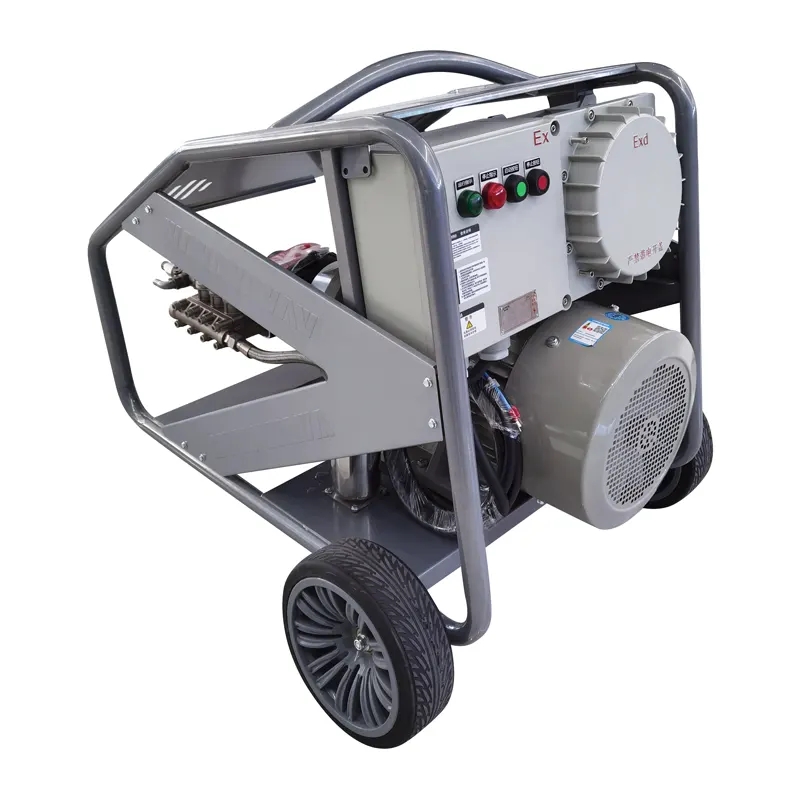Types of Industrial Pressure Washers
2024-07-09
An industrial pressure washer is a powerful cleaning device designed to handle heavy-duty cleaning tasks in industrial and commercial settings. These machines use high-pressure water spray to remove dirt, grime, grease, mold, and other contaminants from various surfaces. Here’s a detailed overview of industrial pressure washers, including their types, advantages, and key features:
Key Features
1. High Pressure
- Description: Industrial pressure washers can generate water pressure ranging from 2,000 to 10,000 PSI (pounds per square inch) or more.
- Benefit: Effectively removes tough dirt, grime, and stains from surfaces.
2. High Flow Rate
- Description: Typically have a higher flow rate, measured in GPM (gallons per minute), often between 2 to 10 GPM.
- Benefit: Covers large areas quickly and efficiently.
3. Durable Construction
- Description: Built with robust materials such as stainless steel and heavy-duty plastics to withstand harsh working conditions.
- Benefit: Ensures longevity and reliable performance.
4. Power Source Options
- Electric: Suitable for indoor use where fumes from fuel engines are a concern.
- Gasoline/Diesel: Provides greater mobility and power, suitable for outdoor and remote locations.
- Propane: Another fuel option offering portability and power, often used in industrial settings.
5. Hot and Cold Water Models
- Cold Water: Efficient for general cleaning tasks.
- Hot Water: Uses heated water to tackle grease, oil, and other stubborn substances more effectively.
6. Multiple Attachments and Accessories
- Nozzles: Different spray patterns for various cleaning tasks.
- Surface Cleaners: Attachments that help clean flat surfaces evenly and quickly.
- Detergent Tanks: Integrated or external tanks for applying cleaning agents.
7. Safety Features
- Automatic Shut-Off: Prevents the pump from overheating and conserves energy.
- Pressure Relief Valves: Protects the machine from pressure build-up.
- Thermal Protection: Prevents overheating of the motor or engine.
Types of Industrial Pressure Washers
1. Electric Pressure Washers
- Advantages: Quieter operation, no emissions, lower maintenance.
- Ideal For: Indoor use, areas with easy access to electrical outlets.
2. Gasoline/Diesel Pressure Washers
- Advantages: More powerful, portable, no need for electrical connection.
- Ideal For: Outdoor use, remote locations, heavy-duty cleaning tasks.
3. Hot Water Pressure Washers
- Advantages: More effective at removing grease, oil, and heavy grime.
- Ideal For: Industrial kitchens, automotive shops, factories.
4. Cold Water Pressure Washers
- Advantages: Simpler design, lower cost, effective for general cleaning.
- Ideal For: Outdoor cleaning, construction sites, agriculture.
Advantages
1. High Cleaning Efficiency
- Explanation: The high pressure and flow rate ensure quick and effective cleaning.
- Result: Saves time and labor compared to manual cleaning methods.
2. Versatility
- Explanation: Can be used on various surfaces, including concrete, metal, wood, and vehicles.
- Result: Suitable for diverse industries like construction, automotive, agriculture, and manufacturing.
3. Enhanced Cleaning Power
- Explanation: Hot water models and detergent application enhance the cleaning capability.
- Result: Removes grease, oil, and other stubborn contaminants more effectively.
4. Durability
- Explanation: Designed to withstand rigorous use in tough environments.
- Result: Long-lasting performance, reducing the need for frequent replacements.
5. Portability
- Explanation: Gasoline/diesel models offer greater mobility.
- Result: Can be used in remote locations without access to electricity.
6. Cost-Effective
- Explanation: Reduces labor costs and cleaning time.
- Result: Provides a good return on investment, especially for businesses with regular cleaning needs.
Considerations
1. Initial Cost
- Explanation: Higher upfront cost compared to consumer-grade pressure washers.
- Result: Considered an investment for businesses requiring regular and heavy-duty cleaning.
2. Maintenance
- Explanation: Requires regular maintenance to ensure optimal performance and longevity.
- Result: Periodic servicing of pumps, engines, and other components is necessary.
3. Safety Precautions
- Explanation: High-pressure water can cause injuries if not used properly.
- Result: Proper training and safety gear are essential for operators.
4. Power Source Requirements
- Explanation: Different models require access to specific power sources (electricity, gasoline, diesel).
- Result: Choose a model that aligns with the available power sources and intended use environment.
Applications
1. Construction Sites
- Cleaning heavy machinery, removing mud and debris from surfaces.
2. Automotive Industry
- Washing vehicles, degreasing engines, cleaning workshops.
3. Manufacturing Plants
- Maintaining equipment, cleaning floors and work areas.
4. Agriculture
- Cleaning barns, tractors, and other farm equipment.
5. Food Processing
- Sanitizing equipment, cleaning floors, and work areas.
6. Public Spaces
- Cleaning sidewalks, parks, public restrooms, and facilities.
Conclusion
An industrial pressure washer is a powerful and versatile tool designed for heavy-duty cleaning tasks across various industries. Its high pressure and flow rate, combined with durable construction and versatile power options, make it an invaluable asset for businesses needing efficient and effective cleaning solutions. When selecting an industrial pressure washer, consider the specific needs of your environment, the type of power source available, and the level of portability required.



